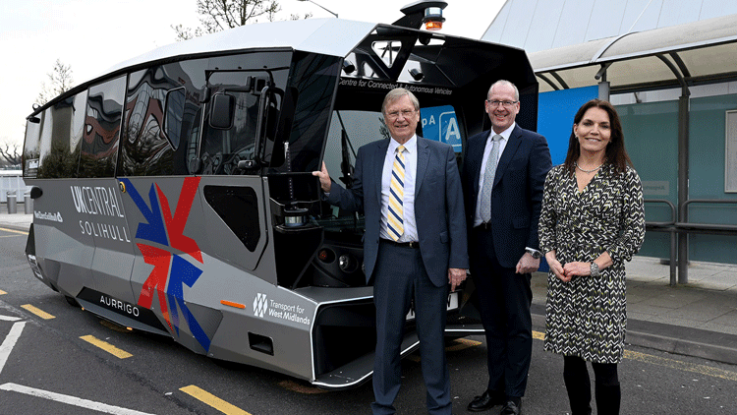
Solihull – a large market town near Birmingham, England – is testing how connected autonomous vehicles (CAVs) may be integrated into the borough’s transport network. The Council-led initiative is using a 10-seater, zero-emissions, autonomous shuttle – called Auto-Shuttle – alongside live traffic on the roads serving Birmingham Airport.
For the 6-week trial, Aurrigo – the designer and maker of the Auto-Shuttle – mapped out a route that will initially serve transport staff within the airport and its parking sites. It is hoped that the trial will be extended to include passengers later this month. The trials will also be open to members of the public who want to experience one of the first fully self-driving shuttles in the UK.
“We are delighted to be working with Solihull Council again to deliver another milestone, with Birmingham Airport becoming the first ever airport to test our autonomous shuttles passenger side on their roads,” said Miles Garner, sales and marketing director at Aurrigo. “Aviation is a major opportunity for Aurrigo, with a genuine desire to find new technologies that can improve the passenger experience. This could be through our driverless shuttles, our Auto-Sim modeling software or it could be through our Auto-Dolly cargo/luggage dolly that can replace the traditional tugs that are commonplace in airports all over the world.”
The shuttle uses a suite of sensors – including lidar – to understand its surroundings and navigate safely around its environment. In line with current legislation, a safety operator will be on-board at all times. The shuttle can be switched over to manual operation with conventional controls. During the trials, the shuttle will be limited to a top speed of 20mph (~ 5.55 kph).
Councillor Ian Courts, Leader of Solihull Council, said: “CAV technology has the potential torevolutionise the way we get around our towns, cities and rural areas as well as transport goods. I’m excited to be the first Council in the country to purchase our very own zero-emission, road-legal, shared use Connected Autonomous Vehicle and we are keen to put it to use. This project is all about looking at how we can practically and safely start to incorporate autonomous vehicles into our future transport infrastructure.”